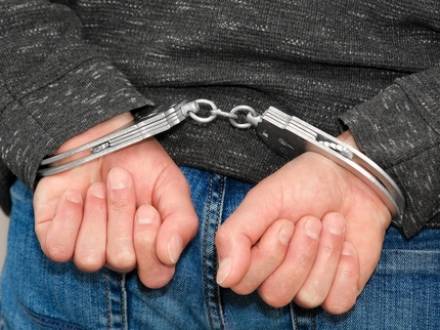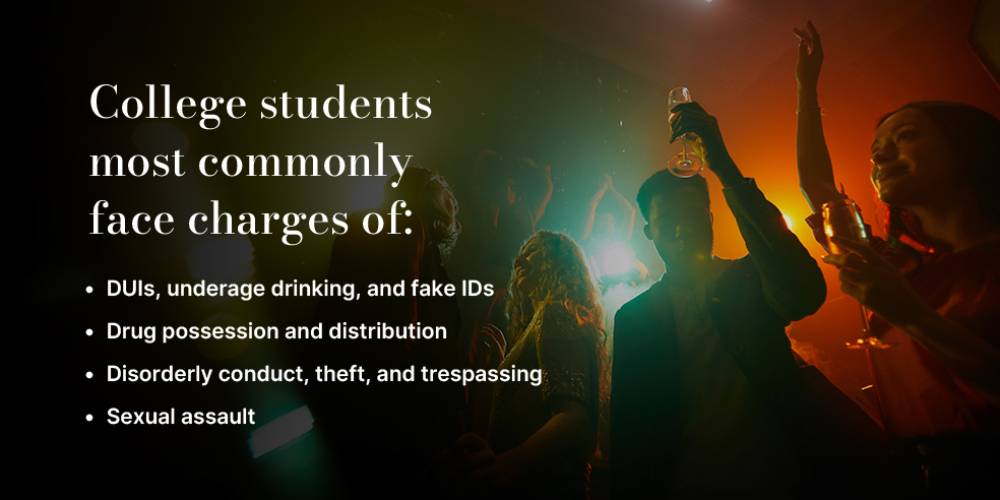Most Common Criminal Charges College Students Face in Wisconsin and What to Do About Them
 College is one of the most exciting and formative times in a young person’s life. For students across Wisconsin, the start of the new school year means freedom, friendships, and personal growth. But freedom also comes with risks. Every year, students at schools throughout the state are arrested or cited for crimes. Convictions and even an arrest can have lasting consequences.
College is one of the most exciting and formative times in a young person’s life. For students across Wisconsin, the start of the new school year means freedom, friendships, and personal growth. But freedom also comes with risks. Every year, students at schools throughout the state are arrested or cited for crimes. Convictions and even an arrest can have lasting consequences.
If you are a college student facing criminal charges, or the parent of a college student in this situation, talking to an experienced, trustworthy Wisconsin criminal defense attorney is the first step you should take. Acting quickly and making smart choices can mean the difference between a temporary setback and a criminal record that follows you or your child for years.
The Most Common Criminal Charges for College and University Students
DUI and OWI (Operating While Intoxicated)
One of the most frequent charges for Wisconsin college students is drunk driving, also called Operating While Intoxicated (OWI) in state law. Wisconsin is known for having strict alcohol-related rules, and a single mistake can come with heavy costs.
For drivers under 21, Wisconsin has a "not a drop" law. This means that any measurable alcohol in your system while driving is enough for an OWI charge. For older students, the legal limit is a blood alcohol concentration (BAC) of 0.08, but penalties increase if BAC is much higher.
An OWI conviction can bring fines, license suspension, mandatory alcohol classes, and even jail time depending on the circumstances. It can also make it harder to keep scholarships, internships, or campus housing.
If you or your child is accused, the first step is to remain respectful and avoid making self-incriminating statements to police. Write down every detail you remember about the stop and testing. Save receipts if you purchased alcohol that night, as timing and amounts may matter later. Parents should also immediately check university rules, since many campuses have separate disciplinary processes for alcohol violations.
Drug Possession and Distribution
Drug charges are another common problem for students. Marijuana remains illegal under Wisconsin law despite neighboring states adopting legalization. Possession of any amount of marijuana can still result in a misdemeanor, and repeat offenses may rise to a felony.
Other substances, including Adderall, Xanax, and opioids, are tightly controlled. Students often face charges for possessing prescription drugs without a valid prescription, sharing pills with friends, or having drugs in a dorm room or car. Distribution or intent-to-distribute charges are even more serious, especially if drugs are found in quantities larger than for personal use or with things like baggies or scales.
If you are under suspicion for drug use, do not consent to searches beyond what is legally required, and take note of how police found any evidence. Parents should look into whether student conduct codes add separate penalties, such as loss of housing or suspension. Helping a student connect to substance abuse resources may also show responsibility and help in court or disciplinary hearings.
Underage Drinking and Fake IDs
Underage drinking is practically a rite of passage on many campuses, but it still leads to thousands of citations each year. Possession of alcohol by anyone under 21 can result in fines and driver’s license suspension. Being caught using a fake ID, especially to purchase alcohol, adds another layer of trouble.
Students should be aware that being cited for underage drinking may not feel like a big deal at the time, but repeat violations can escalate penalties and show up on background checks. Parents can help by making sure their child understands how fines must be paid and by monitoring whether the school is imposing additional consequences like probation or mandatory classes.
Disorderly Conduct
Disorderly conduct is a broad charge that covers a wide range of behaviors. Fights at parties, loud arguments, public intoxication, or even being too disruptive in a dorm hallway can lead to this misdemeanor charge. The vague definition of disorderly conduct means police often use it as a catch-all when they want to remove someone from a situation.
If charged, students should carefully document what happened, especially if their behavior was misinterpreted or if they were simply present when others were causing problems. Parents can encourage their child to collect witness names and statements as soon as possible.

Trespassing
Trespassing is another common issue for college students. Entering buildings, athletic facilities, or restricted areas on campus without permission may seem harmless, but it can lead to criminal charges. In some cases, trespassing charges are linked to pranks, dares, or protests.
The best immediate response is to clarify exactly where and when the student was accused of being on the property. Sometimes confusion about campus boundaries or open public spaces can create misunderstandings. Parents should advise their child to keep copies of campus maps, tickets, or event information if those details are relevant.
Sexual Assault and Consent Issues
Among the most serious charges college students may face are sexual assault and related offenses. These cases are especially complex because they often involve alcohol, conflicting accounts, and questions about consent. Even an accusation alone can have devastating consequences, including suspension, expulsion, loss of scholarships, and a permanent criminal record.
Wisconsin law defines sexual assault in several degrees, ranging from unwanted sexual contact to sexual intercourse without consent. Penalties can include long prison sentences, lifetime sex offender registration, and severe restrictions on future employment.
If accused, the student should not discuss the case with anyone except their attorney. Do not post about the situation on social media, and do not contact the accuser. Parents should remain calm, supportive, and proactive in gathering information about both the criminal case and any university investigation.
Theft and Property Crimes
Shoplifting from local stores, stealing from dorm rooms, or damaging property can lead to theft or criminal damage charges. While some students may think of these incidents as minor, a conviction can still create a permanent record.
Parents should encourage their child to gather receipts, bank statements, or other proof of lawful purchases if the accusations are false. If restitution is an option, students should consider paying for damages quickly to minimize penalties.
Contact a Wisconsin Criminal Defense Attorney for College Students Today
If you are a college student facing criminal charges – or you are a parent of a college student facing criminal charges – you may be surprised by how a good attorney can help your case. Call our Milwaukee, WI college student criminal defense lawyers at Gimbel, Reilly, Guerin & Brown, LLP to get help in a judgment-free zone. We know good kids make mistakes and our priority is to protect your future. Call 414-271-1440 now.







